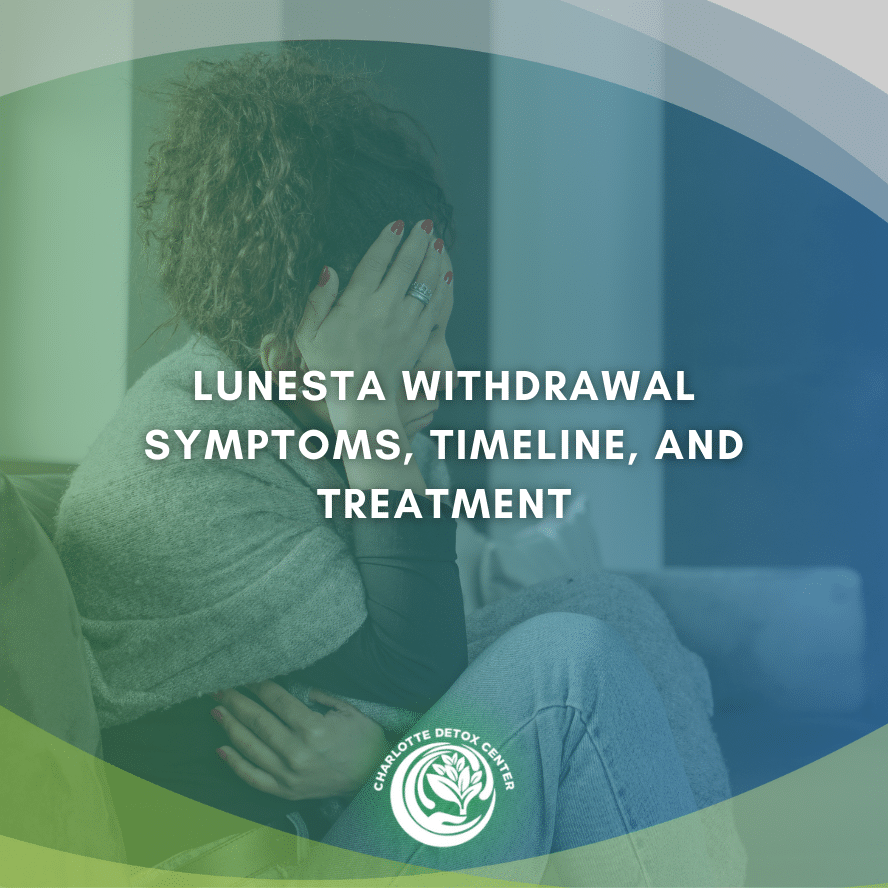Lunesta Withdrawal Symptoms, Timeline, and Treatment

Medically Verified: 2/1/24
Medical Reviewer
Chief Editor

All of the information on this page has been reviewed and verified by a certified addiction professional.
Lunesta is the name brand for a non-benzodiazepine sedative medication called eszopiclone, which is used to treat insomnia. Eszopiclone works by interacting with certain neurotransmitters in your brain to allow you to sleep.[1] While Lunesta is less habit-forming than benzodiazepine sedative medications, it can still cause physical dependence and addiction.
If you become dependent on or addicted to Lunesta, you will experience withdrawal symptoms after abruptly stopping the medication. As a result, it is not recommended to take Lunesta for longer than 2 weeks at a time. When you are ready to come off of the medication, your doctor will taper your dosage to prevent you from experiencing withdrawal symptoms.
The severity and duration of Lunesta withdrawal may vary from one person to the next, and symptoms can range from uncomfortable to severe. If you or a loved one need help detoxing from Lunesta, please contact our team at Charlotte Detox Center today to see how we can help.
What are the Symptoms of Lunesta Withdrawal?
The withdrawal symptoms of Lunesta can vary from person to person based on the dose, frequency of use, length of use, and individual health.
Common symptoms of Lunesta withdrawal include:[2]
- Anxiety or panic attacks
- Excessive sweating
- Irritability and mood swings
- Weird dreams
- Muscle spasms and tremors
- Nausea and vomiting
- Fatigue
- Rebound insomnia
- Short-term memory issues
- Concentration issues
- Depression
- Stomach cramps
While Lunesta withdrawal is not typically life-threatening, individuals who abused large doses could experience seizures. As a result, if you suffer from an addiction to Lunesta you should always attend a medical detox program that can provide you with proper treatment.
The Lunesta Withdrawal Timeline
The Lunesta withdrawal timeline can vary from person to person. With that being said, a general timeline for Lunesta withdrawal is as follows:
24 to 48 Hours
Around 24 hours after your last dose of Lunesta, you may begin to experience withdrawal symptoms. It is most common to experience anxiety, restlessness, and insomnia. These are rebound symptoms, which means a recurrence of the symptoms you were originally being treated for.
Days 3 to 7
Sometime between the third and seventh day of withdrawal, your symptoms will peak. Symptoms might include nausea, vomiting, restlessness, anxiety, insomnia, and fatigue.
During this stage of withdrawal, you must have access to medical treatment and support. The severity of your symptoms could cause you to relapse or self-medicate, introducing you to new dangers like overdoses and addiction.
2 Weeks
Sometime between 7 days to 2 weeks, your withdrawal symptoms will subside. Some people have reported experiencing lingering symptoms like anxiety, insomnia, or depression. This is known as post-acute withdrawal syndrome (PAWS).[3]
What Factors Can Influence the Lunesta Withdrawal Symptoms and Timeline?
The symptoms you experience and how long they affect you can be influenced by a variety of factors. Some of the most notable factors include whether you were addicted to the substance and what dose you were taking.
Factors that influence Lunesta withdrawal symptoms and timeline include:
- How long you were taking Lunesta
- The dosage you usually consume
- Whether you are addicted or simply dependent on the substance
- If you abused other substances
- Your mental and physical health
- Age
- Metabolism
- Weight
- Whether you have experienced addiction and relapses in the past
How is Lunesta Withdrawal Treated?
Lunesta withdrawal is primarily treated through the tapering method, meaning your doctor will gradually reduce your dose over a period of time. Tapering gives your body the time it needs to adjust before Lunesta is completely removed from your system.
Lunesta can cause dependency among individuals taking the medication as prescribed if they exceed the recommended two-week period. In these situations, withdrawal can be treated outside of a detox facility. However, people who were abusing Lunesta should seek help from a medical detox program.
If you are addicted to Lunesta and attend a detox program, you will be tapered off of the medication similarly. However, your treatment will include evidence-based behavioral therapy, group counseling, and relapse prevention planning to help you recover from your substance use disorder. Sometimes this includes transitioning into a residential or outpatient addiction treatment program after you complete detox.
Get Connected to a Lunesta Detox Program today
If you or a loved one are addicted to Lunesta, recovery is possible. While it can be daunting to think about quitting eszopiclone when you suffer from insomnia, a medical detox program can find you a non-habit-forming medication to replace Lunesta.
With a combination of emotional support, evidence-based therapy, and medical detoxification techniques, Charlotte Detox Center can provide you with everything you need to achieve long-term sobriety and overcome withdrawal.
To learn more about our prescription drug detox program, contact Charlotte Detox Center today.
References:
